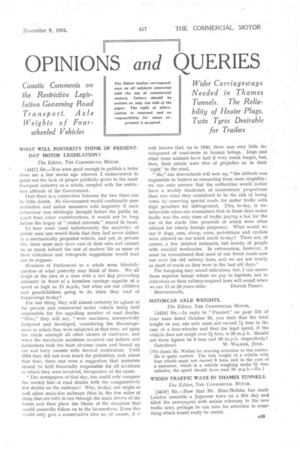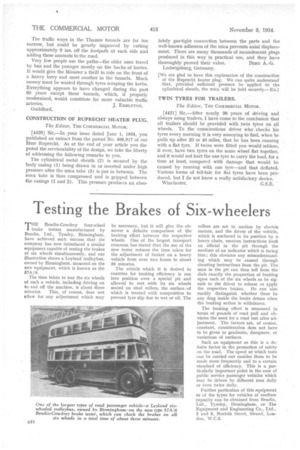OPINIONS and QUERIES WHAT WILL POSTERITY THINK OF PRESENTDAY MOTOR LEGISLATION?
Page 73

Page 74

If you've noticed an error in this article please click here to report it so we can fix it.
The Edttor, THE COMMERCIAL MOTOR.
[4417] Sir,—You were good enough to publish a letter from me a few weeks ago wherein I endeavoured to point out the lack of proper publicity given to the roadtransport industry as a whole, coupled with the restrictive attitude of the Government.
That there is a connection between the two there can be little doubt. No Government would continually pass restrictive and unfair measures with impunity if such behaviour was strikingly brought before the public as, apart from other considerations, it would not be long before the bogey of vested interests reared its head.
To hear some (and unfortunately the majority) of public men one would think that they had never ridden in a mechanically propelled vehicle, and yet, in private life, these same .men have cars of their own and cannot be so much behind the rest of modern life as some of their ridiculous and retrograde suggestions would lead one to suppose.
Members of Parliament as a whole seem blissfully careless of what posterity may think of them. We all laugh at the idea of a man with a red flag proceeding solemnly in front of a horseless carriage capable of a speed as high as 15 m.p.h., but what are our children and grandchildren going to do when they read of happenings to-day?
For one thing, they will almost certainly be aghast at the private and commercial motor vehicle being held responsible for the appalling number of road deaths. "Here," they will say, "were machines, unexpectedly foolproof and developed, considering the discouragement to which they were subjected at that time, set upon the roads amongst all other classes of road-user, and when the inevitable accidents occurred our fathers and forefathers took the least obvious cause and bound up car and lorry owners with farcical restrictions. Until 1934 they did not even touch the pedestrian, and, about that time, there was even a suggestion that motorists should be held financially responsible for all accidents in which they were involved, irrespective of the cause.
"The newspapers of that day, too, could only compare the weekly lists of road deaths with the comparatively few deaths on the railways! Why, to-day, one might as well allow main-line railways (that is, the few miles of thern that are left) to run through the main streets of the towns and then place the blame of the slaughter that would assuredly follow on to the locomotives. Even this would only give a conservative idea as, of course, it is
well, known that, up to 1940, there was very little development of road-sense in human beings. Dogs and other tame animals have had it very much longer, but, then, their minds were free of prejudice as to their 'right' to the road.
"No," our descendants will sum up, "the attitude was impossible to believe as emanating from mere stupidity-c we can only assume that the authorities would rather have a weekly death-rate of unnecessaryproportions than run what they considered to be the risk of losing votes by reserving special roads for motor traffic with high penalties for infringement. This, to-day, is unbelievable when one remembers that in those days motor traffic was the only class of traffic paying a tax for the use of the roads (the proceeds of which were often utilized for utterly foreign purposes). What would we say if dogs, cats, sheep, cows, pedestrians and cyclists were allowed on our trunk roads to-day? There are, of course, a few isolated instances, but mainly of people with suicidal tendencies. In extenuation, however, it must be remembered that most of our trunk roads now run over the old railway lines, and we are not nearly so short of roads as they were in the bad old days."
The foregoing may sound ridiculous, but, I can assure those superior beings whom we pay to legislate, not so ridiculous as their railway-inspired laws will sound when we are 15 or 20 years older. DENNIS PERRY. Bournemouth,
MOTORCAR AXLE WEIGHTS.
The Editor, TILE COMMERCIAL MOTOR.
[4418] Sir,—In reply to "Puzzled," on page 350 of your issue dated October 26, you state that the total weight on any one axle must not exceed 74 tons in the case of a four-wheeler and that the legal speed, if the vehicle does not weigh over 24 tons, is 20 m.p.h. Should not these figures be 8 tons and 30 m.p.h. respectively?
Gateshead. W. WALKER, JUNE.
[We thank Mr. Walker for drawing attention to this matter. He is quite correct. The axle weight of a vehicle with four wheels must not exceed 8 tons, and in the case of a motorcar, which is a vehicle weighing under 2-k tons unladen, the speed should have read 30 m.p.h.—En.1
WIDEN TRAFFIC WAYS IN THAMES TUNNELS. The Editor, THE COMMERCIAL MOTOR.
[4419] Sir,—Now that Mr. Hore-Belisha has made London resemble a Japanese town on a fete day and filled the newspapers with serials referring to the new traffic laws, perhaps he can turn his attention to something which would really be useful. The traffic ways in the Thames tunnels are far too narrow, but could be greatly improved by cutting approximately 9 ins, off the footpath at each side and adding these amounts to the road.
Very few people use the paths—the older ones travel by bus and the younger mostly on the backs of lorries. It would give the Minister a thrill to ride on the front of a heavy lorry and meet another in the tunnels. Much money must be wasted through tyres scraping the kerbs. Everything appears to have changed during the past 00 years except these tunnels, which, if properly modernized, would constitute far more valuable traffic
arteries. J. EMBLETON. Guildford,
CONSTRUCTION OF RUPRECHT HEATER PLUG.
The Editor, THE COMMERCIAL MOTOR.
[4420] Sir,—In your issue dated June 1, 1934, you published an extract from the patent No. 408,917 of our Herr Ruprecht. As at the end of your article you disputed the serviceability of the design, we take the liberty of addressing the following remarks to you.
The cylindrical metal sheath (2) is secured by the body casing (1) being drawn in or inserted under high pressure after the mica tube (3) is put in between. The mica tube is thus compressed and is gripped between the casings (1 and 2). This pressure produces an abso
lutely gas-tight connection between the parts and the well-known adhesion of the mica prevents axial 'displacement. There are many thousands of incandescent plugs produced in this way in practical use, and they have
thoroughly proved their value. BERU A.-G. Ludwigsburg, Germany.
[We are glad to have this explanation of the construction of the Ruprecht heater plug. We can quite understand that, provided sufficient pressure be applied to the cylindrical sheath, the mica will be held securely.—En.] TWIN TYRES FOR TRAILERS.
The Editor, THE COMMERCIAL MOTOR.
[4421] Sir,—After nearly 30 years of driving and always using trailers, I have come to the conclusion that all trailers should be provided with twin tyres on all wheels. To the conscientious driver who check S his tyres every morning it is very annoying to find, when he pulls up after 30 or 40 miles, that he has been running with a flat tyre. If twins were fitted you would seldom, if ever, have two tyres on the same wheel flat together, and it would not hurt the one tyre to carry the load, for a time at least, compared with damage that would be caused by running with one tyre—and that deflated. Various forms of tell-tale for flat tyres have been produced, but I do not know a really satisfactory device.
Winchester. G.S.E.
























































































































